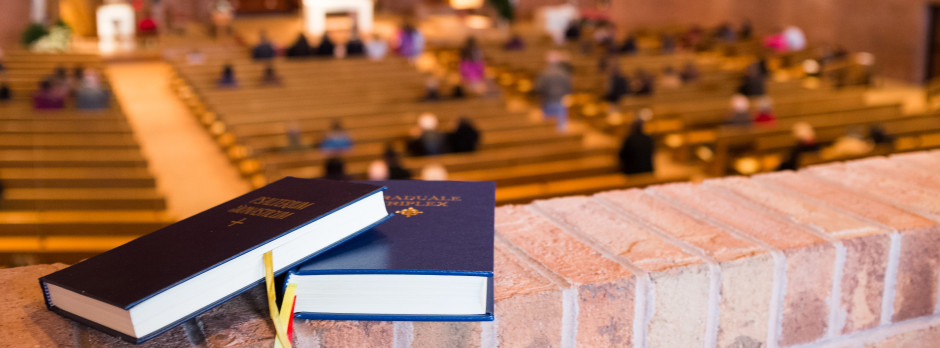October 6 is the feast of St. Bruno of Cologne, founder of the Carthusian Order.
The Carthusians are famous as by far the most austere Western monastic order. Their motto is Stat crux dum volvitur orbis (“The Cross is steady while the world turns”), and of them it is said that Cartusia nunquam reformata, quia nunquam deformata (“The Carthusians have never reformed, because they have never deformed”).
Most Carthusian monasteries don’t allow visitors who are not discerning a vocation, but the 2005 documentary film Into Great Silence gives a glimpse of their life.
The Carthusians are also famous for one of the world’s great liqueurs, Chartreuse, with which they support themselves. The green variety is the official liqueur of the Sts. Gregory and Romanos Guild.
St. Bruno carefully guarded his humilty by refusing ecclesiastical honor in his lifetime, and the Carthusians honor his choice by not giving him his own hymn in their liturgy. Instead, he gets only the common hymn of a monk. Here is the Carthusian tune for it, transcribed into Roman square notes, with English translation by Percy Dearmer (1867-1936):
1. Serve Dei, qui únicum
Patris sequéndo Fílium,
Victis triúmphas hóstibus,
Victor fruens cæléstibus.
2. Tui precátus múnere
Nostrum reátum dílue,
Arcens mali contágium,
Vitæ rémovens tædium.
3. Solúta sunt iam víncula
Tui sácrati córporis:
Nos solve vinclis sæculi
Amóre Fílii Dei.
4. Deo Patri sit glória,
Eiúsque soli Fílio,
Cum Spíritu Paráclito
Et nunc et in perpétuum. Amen.
1. Servant of God, whose strength was steeled
To follow close God’s only Son,
Well didst thou brave thy battlefield,
And well thy heavenly bliss was won!
2. Now join thy prayers with ours, who pray
That God may pardon us and bless;
For prayer keeps evil’s plague away,
And draws from life its weariness.
3. Long, long ago, were loosed the chains
That held thy body once in thrall;
For us how many a bond remains!
O Love of God, release us all.
4. All praise to God the Father be,
All praise to Thee, eternal Son;
All praise, O Holy Ghost, to Thee
While never-ending ages run. Amen.
The text is a variant of the anonymous hymn for feasts of martyrs
Martyr Dei, qui unicum. There’s something deeply appropriate about that: the Greek root from which we get “martyr” means “witness,” and in the austerity and simplicity of their lives the Carthusians witness to the vanity of the passing world and the joy and stability of deep union with God.
Stat crux dum volvitur orbis.
As usual, here’s a printable PDF version of the hymn.

Gloria Cartusiæ
October 6 is the feast of St. Bruno of Cologne, founder of the Carthusian Order.
The Carthusians are famous as by far the most austere Western monastic order. Their motto is Stat crux dum volvitur orbis (“The Cross is steady while the world turns”), and of them it is said that Cartusia nunquam reformata, quia nunquam deformata (“The Carthusians have never reformed, because they have never deformed”).
Most Carthusian monasteries don’t allow visitors who are not discerning a vocation, but the 2005 documentary film Into Great Silence gives a glimpse of their life.
The Carthusians are also famous for one of the world’s great liqueurs, Chartreuse, with which they support themselves. The green variety is the official liqueur of the Sts. Gregory and Romanos Guild.
St. Bruno carefully guarded his humilty by refusing ecclesiastical honor in his lifetime, and the Carthusians honor his choice by not giving him his own hymn in their liturgy. Instead, he gets only the common hymn of a monk. Here is the Carthusian tune for it, transcribed into Roman square notes, with English translation by Percy Dearmer (1867-1936):
Patris sequéndo Fílium,
Victis triúmphas hóstibus,
Victor fruens cæléstibus.
2. Tui precátus múnere
Nostrum reátum dílue,
Arcens mali contágium,
Vitæ rémovens tædium.
3. Solúta sunt iam víncula
Tui sácrati córporis:
Nos solve vinclis sæculi
Amóre Fílii Dei.
4. Deo Patri sit glória,
Eiúsque soli Fílio,
Cum Spíritu Paráclito
Et nunc et in perpétuum. Amen.
To follow close God’s only Son,
Well didst thou brave thy battlefield,
And well thy heavenly bliss was won!
2. Now join thy prayers with ours, who pray
That God may pardon us and bless;
For prayer keeps evil’s plague away,
And draws from life its weariness.
3. Long, long ago, were loosed the chains
That held thy body once in thrall;
For us how many a bond remains!
O Love of God, release us all.
4. All praise to God the Father be,
All praise to Thee, eternal Son;
All praise, O Holy Ghost, to Thee
While never-ending ages run. Amen.
As usual, here’s a printable PDF version of the hymn.